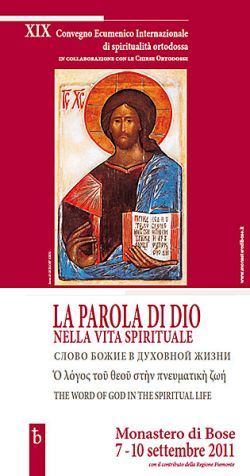Final press release
on Orthodox spirituality
Bose, 12 September 2011
THE WORD OF GOD
IN THE SPIRITUAL LIFE
Bose, Wednesday 7 - Saturday 10 September 2011
“If God had not wanted to narrate Himself to us, nothing in creation would have been capable of speaking about Him,” says Ephrem the Syrian in one of his hymns (On the faith, 44, 7). God reveals Himself to man, but remains hidden: He awaits man’s response. Scripture reveals God and at the same time initiates the road that man takes in his heart to seek and find God, to listen and respond to His Word; this is also the itinerary of the spiritual life.
“The Word of God in the spiritual life” was the theme on which Biblical scholars, patrologists, theologians, and representatives of the various Orthodox Churches, of the Catholic Church, and of the Churches of the Reform have reflected during the four days of intensive study and fraternal exchanges of the 19th International Ecumenical Conference on Orthodox spirituality (Bose, 7–10 September 2011). The symposium, opened by the addresses of the prior of Bose, Enzo Bianchi, and of metropolitan Chrysostomos of Messenia of the Orthodox Church of Greece (The Bible in liturgical celebration) and concluded with the papers of metropolitan Elpidophoros of Bursa (Patriarchate of Constantinople) on Sacred Scripture in the spiritual life and of metropolitan Ilarion of Volokolamsk, president of the Department for External Affairs of the Patriarchate of Moscow, on The importance of the Bible for Orthodox theology.
In the Orthodox tradition, as many speakers have acknowledged, the unity of Sacred Scripture and exegesis in the Spirit is fundamental. The prayerful assimilation of the Word of God in the course of Tradition, understood as a continual work of the Spirit, who reveals the mystery of Christ, is brought about in the liturgy, in the Christian’s personal prayer, in the various forms of the monastic tradition. The principle of a spiritual reading of the Bible is summed up, as patriarch Bartholomew of Constantinople recalls in his message to the Conference, by the monk Mark of the fifth century: “He who is humble in his thoughts and occupied in the spiritual work, when he reads the Holy Scriptures, he applies everything to himself”. Taking up a famous image of abba Poemen, the patriarchs expresses the hope that the encounter with the living Word of God, like the water that drop by drop wears away the rock, may verse after verse transform “our existence into living cells of Christ’s Body”. The problems chosen for discussion this year, observes in his turn patriarch Kirill of Moscow in his message, “ask us to reflect on the very foundations of being Christian,” and invite all “to turn our mind’s eye to Sacred Scripture,” so that, according to the example of the holy fathers, “the reading of Sacred Scripture may reinvigorate the observance of the Lord’s commandments and the following of Christ. Obedience to the Word of God contained in Scripture, “loved equally in the East and in the West”, is also the way for “renewing the commitment of spiritual communion” among Christians, as pope Benedict XVI expresses it in the telegram sent through the Secretary of State, cardinal Tarcisio Bertone. “The encounter with Sacred Scripture, understood as a spiritual event, hence a true encounter with the Word of the living God,” wrote cardinal Kurt Koch, President of the Pontifical Council for promoting Christian unity, can bring important fruit in the sphere of relations among Christians of different Churches and ecclesial communities.”
Numerous greetings arrived, among them those of patriarch Ignatius IV of Antioch, Irinej, patriarch of the Serbian Orthodox Church, Daniel, patriarch of the Romanian Orthodox Church, archbishop Hieronymos II of Athens, Karekin II, catholicos of all Armenians, cardinal Leonardo Sandri, prefect of the Congregation for the Oriental Churches, , archbishop Rowan Williams of Canterbury, metropolitan Filaret of Minsk and Sluck, bishop Mariano Crociata, general secretary of the Italian Bishops’ Conference, Olav Fikse, Tveit, general secretary of the World Council of Churches.
